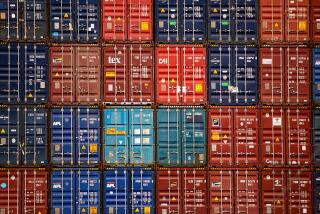Congressional Testimony : Efforts to Halt Dollar Rise Have Failed, Volcker Says
WASHINGTON — Federal Reserve Chairman Paul A. Volcker said Tuesday that recent actions undertaken to stem the rapid rise of the U.S. dollar on foreign exchange markets, including intervention by central banks, have not been forceful enough.
“If the proof of the pudding is in the eating,” Volcker told a House Banking subcommittee, then the efforts have failed, since the dollar has continued to rise.
However, as soon as foreign exchange markets became aware of his remarks, the dollar plunged. The dollar dropped from 3.47 to 3.39 German marks in the space of about five minutes.
“Now the feeling is split,” said one market analyst in New York. “Some people think this is the first sign of a dollar decline and others think we will have the dollar at 3.50 marks by the weekend.”
Volcker, who essentially repeated the testimony on the economy and the Fed’s monetary policy plans that he gave last week to the Senate Banking Committee, also indicated that the strength of the dollar has become “a moderating influence” in the central bank’s discussions about any possible tightening of its monetary policy position.
Fed ‘Not Alarmed’
The Fed chairman noted that money supply growth has been “well in excess of our targets.” Central bank policy-makers are “not alarmed by the level of the ‘M’s”--the various measures of money--but they are worried about the money supply’s “trajectory.”
He reiterated that the Fed stopped easing its monetary policy stance last month but that it has not begun to tighten that policy. “The value of the dollar in foreign exchange markets . . . has been a moderating influence on going in the other direction, which we have not done,” Volcker told the subcommittee.
A move toward tightening--making reserves less readily available to financial institutions--would tend to raise short-term interest rates and, all other things being equal, the value of the dollar as well, in the opinion of most analysts.
Should the currency begin to weaken, for whatever reason, Volcker said, “some decline in the dollar would not be adverse,” since it has risen so strongly since the first of the year. But he warned that a larger reversal of that trend could mean higher interest rates and higher inflation.
Policy Changes
The Fed chairman said that intervention in exchange markets “is not likely to be an answer standing alone.” More fundamental policy changes, such as major progress on reducing federal budget deficits, are needed in the United States, while other countries take actions to stimulate their domestic economies.
“I don’t like what’s been going on in the markets, either the volatility or the direction,” he declared.
Volcker said that the current situation, in which more than $100 billion worth of foreign capital is flowing into the United States annually in excess of that being sent abroad by Americans, is an unstable and risky one. “The incentive to put money in the United States could prove quite fragile” to a shift in expectations about future inflation and interest rates, he warned.
“We are hostage to, we are hooked on, foreign capital for a while” because of the large budget and trade deficits. The price of that dependency is that “if we cannot get so easily the foreign capital we need, then interest rates will rise” and domestic credit users, such as housing and investing businesses, will get crowded out of the market. “That’s the risk,” he said.
Volcker said that he cannot predict when foreigners might become less willing to invest in the United States, but he added: “It’s an increasingly uncomfortable situation. We are putting ourselves at risk.”
More to Read
Inside the business of entertainment
The Wide Shot brings you news, analysis and insights on everything from streaming wars to production — and what it all means for the future.
You may occasionally receive promotional content from the Los Angeles Times.








